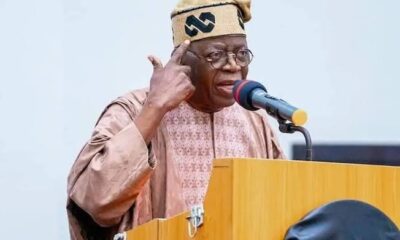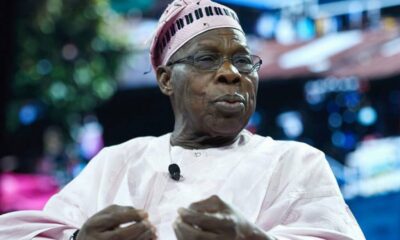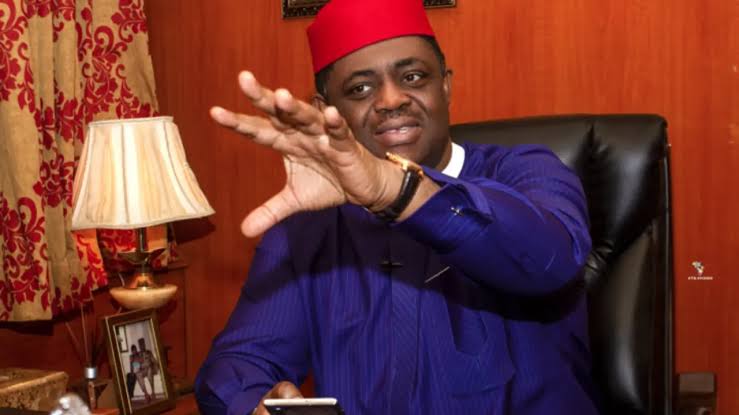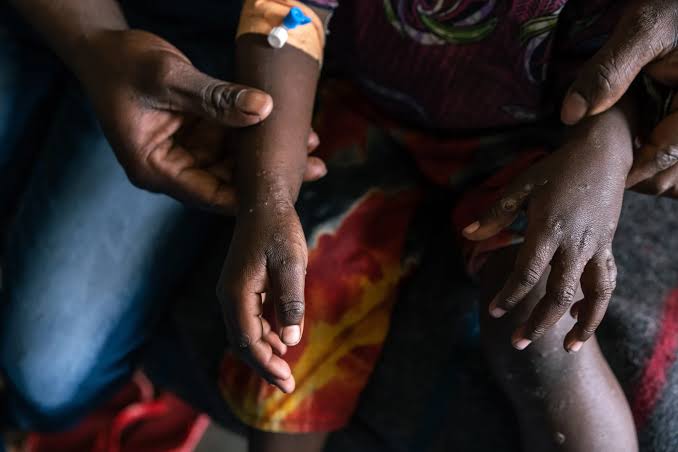Metro
Atiku not giving up as he seeks leave of Nigeria’s Supreme Court to file fresh evidence against Tinubu
Published
1 year agoon

The candidate of the Peoples Democratic Party (PDP) in Nigeria’s disputed February 25 presidential election, Atiku Abubakar, is not giving up on his quest to remove President Bola Tinubu from office, as he has applied for leave of the Supreme Court to file as fresh evidence to support his case.
In the motion he filed through his team of lawyers led by Chief Chris Uche (SAN), Atiku said the evidence he was seeking to tender before the apex court would further establish his allegation that Tinubu submitted forged documents to the Independent National Electoral Commission, (INEC) as his qualification to participate in the presidential election.
The former vice president opined that by submitting the forged documents, President Tinubu had “committed a twin offence of forgery and perjury, and therefore deserved to be sacked from office by the Supreme Court.”
Atiku specifically sought the leave of the court to tender Tinubu’s academic records which were handed over to him by the Chicago State University, (CSU), on October 2.
The motion states that the 32-paged document released by the CSU on the orders of Judge Nancy Maldonado of the District Court of Illinois, United States of America, had proven that the certificates presented by the president were forged.
He further based his motion for leave to file fresh evidence against Tinubu on Order 2, Rule 12(1) of the Supreme Court Rules 1985, Section 137(1) of the 1999 Constitution, as well as the inherent jurisdiction of the apex court as encapsulated in section 6(6)(a) of the 1999 Constitution.
The PDP flagbearer prayed the court for an order granting him leave:
“To produce and for the court to receive fresh and additional evidence by way of deposition on oath from the Chicago State University for use in this appeal to wit: the certified discovery deposition made by Caleb Westberg on behalf of Chicago State University on October 3, 2023, disclaiming the certificate presented by the 2nd respondent, Bola Ahmed Tinubu to the Independent National Electoral Commission.”
He also prayed the apex court to:
“Receive the said deposition in evidence as exhibit in the resolution of this appeal and to further make order or orders the apex court may deem fit to make in the circumstances of the case.
“The deposition is relevant to this matter, having confirmed that the certificate presented by the 2nd Respondent to the Independent National Electoral Commission (INEC) did not emanate from Chicago State University, and that whoever issued the certificate presented by the 2nd Respondent, did not have the authority of the Chicago State University, and that the 2nd Respondent never applied for any replacement certificate nor was he issued any replacement certificate by the Chicago State University,” the motion reads.
“The deposition which is on oath and deposed to in the presence of the 2nd Respondent’s Attorney is credible and believable, and ought to be believed.
“The deposition is clear and unambiguous, and no further evidence is needed to be adduced on it. The evidence is such that could not have been obtained with reasonable diligence for use at the trial, as the deposition required the commencement of the suit in the United States of America before receiving same. It was not possible to obtain the said evidence before the trial at the Court.
“The deposition was made on October 03, 2023 after the conclusion of trial at the Court below, and was not available to be tendered at the trial,” Atiku averred.
He added that the presentation of a forged certificate to INEC by a candidate for election to the office of President of the Federal Republic of Nigeria was a weighty constitutional matter, requiring consideration by the Courts as custodians of the Constitution.
Atiku’s legal team said they would, during the hearing at the Supreme Court, rely on the Record of Appeal already transmitted.
“My Lords, we most humbly adopt the facts as presented in the supporting affidavit, and same will be referred to in the course of the argument.
“Order 2 Rule 12 (7), (2) and (3) of the Supreme Court Rules provide as follows:
(1) A party who wishes the Court to receive the evidence of witnesses (whether they were or were not called at the trial) or to order the production of any document, exhibit or other thing connected with the proceedings in accordance with the provisions of Section 33 of the Act, shall apply for leave on notice of motion prior to the date set down for the hearing of the appeal.
“The application shall be supported by affidavit of the facts on which the party relies for making it and of the nature of the evidence or the document concerned.
“The evidence required to establish that the certificate presented by the 2nd Respondent to the 1st Respondent in support of his qualification to contest the said election is the deposition from the Chicago State University, which deposition did not become available until after the determination of the case by the lower Court. The said evidence is now available, and forwarded to this Honourable Court.
“We submit that the Appellants/Applicants have successfully explained the delay and difficulties in obtaining the said evidence earlier than now, and all the necessary steps taken to obtain the evidence and to present same to this Honourable Court.”
You may like
-


‘Pray for leaders to serve you diligently,’ President Tinubu tells Nigerians
-


Nigeria on the right path despite hardship, criticism— President Tinubu
-


Ghana’s Supreme Court dismisses suit challenging anti-LGBT bill
-


‘I don’t take pleasure in causing you pains,’ Tinubu tells Nigerians amid hardship
-


Start anti-corruption war from the top, former President Obasanjo tells Nigerian govt
-


Yes, Nigerians are suffering but better days are ahead— Tinubu
Metro
‘Don’t start what you can’t finish’, ex-Nigerian official replies President Tchiani
Published
3 weeks agoon
December 29, 2024
Former Nigerian Aviation Minister, Femi Fani-Kayode, has told President Abdourahamane Tchiani of Niger Republic to refrain from making infantile and puerile allegations that Nigeria is conniving with France and the Lakurawa terrorists to destabilize his country.
Tchiani had, during an interview with Radio-Télévision du Niger on December 25, accused the Nigerian government of using the sect, with the help of foreign security forces notably from France, to wreck havoc in his country, insinuating that President Bola Tinubu had been paid by the France government to allow their military to establish a base in Borno State.
He also alleged that Nigeria, acting in collaboration with the French government and the terrorist group, was responsible for an attack on the Niger-Benin oil pipeline on December 13, 2024, in Gaya, Dosso Region of Niger Republic.
But in a statement he posted on his official X handle on Sunday, Fani-Kayode who is popularly called FFK, said Nigeria does not need the help of France and thr Lakurawa terrorist to destabilize Niger Republic.
FFK insisted that Nigeria is not part of the western powers sponsoring terrorists organizations to wretch havoc on the West African sub region.
“If Nigeria wanted to destabilise Niger Republic, I do not believe that we would need France or any terrorist organisation to do so,” the politician wrote.
He noted that on the contrary, western powers are the ones behind terrorist organizations operating in the region and other parts of Africa.
“I have maintained that the western powers are behind the terrorist groups that have plagued the West African sub region over the last 15 years and for the last ten years I have publicly stated this and given my reasons.
“I am equally certain that Nigeria, being one of the major victims of these terrorist organisations, has had no part in it and that no Nigerian President, past or present, has indulged in such grave and dangerous actions.”
He went on to advice Tchiani against provoking Nigeria with unguarded and infantile utterances capable of stoking Nigeria against his country.
“The Nigerien Military Head of State, Abdourahamane Tchiani, would do well to be careful not to provoke our wrath with his absurd assertions and remain mindful of the fact that the defence budget for his country, Mali and Burkina Faso COMBINED is not up to 25% of Nigeria’s.
“Tchiani’s grave allegations that President Tinubu and NSA Nuhu Ribadu have been bought by the French to destabilise Niger Republic, that our Government is jointly sponsoring a terrorist group with France to do same and that there are French military bases in Nigeria are infantile, puerile, mendacious and asinine.
“It is a squalid attempt by the Nigerien Head of State to sow the seeds of dissention in our country, to alienate our people from constituted authority, to divide our people and to undermine the Tinubu administration,” he added.
“It is also highly provocative and the FG should consider the possibility of taking other more extreeme measures if this reckless provocation continues.
“We are under no obligation to show restraint when we are being undermined and maligned.
Metro
Zambia announces second case of Mpox as country battles cholera outbreak
Published
4 weeks agoon
December 28, 2024
The Zambian Ministry of Health has reported a second case of Monkeypox, popularly known as Mpox, in Kitwe region of Copperbelt Province.
Acting Health Minister, Douglas Syakalima, who made the announcement on Friday during a press conference in Lusaka, revealed that the Ministry is intensifying contact tracing and surveillance to curb further spread of the disease.
Syakalima who also addressed the ongoing cholera outbreak in Nakonde, Muchinga Province, said thus far, seven cases have been confirmed.
“The second Mpox case involves a 34-year-old female from Ndeke, Kitwe, who presented with symptoms including rash, fever, swollen lymph nodes, and oral ulcers on December 21,” Syakalima said at the press parley.
He noted that there was an initial misdiagnosis with chickenpox in Lumwana, North-Western Province, but laboratory tests on December 26 confirmed that it was Mpox.
Syakalima added that the patient’s husband, who works in a neighboring country with confirmed Mpox cases, had experienced similar symptoms earlier this month.
“Both patients are now stable and under close monitoring. A rapid response team has been deployed to trace contacts and prevent further spread,” he said, adding that eight close contacts of the couple are currently under observation, while nationwide surveillance has been heightened.
The Health Minister added that on December 26, five cholera cases were confirmed at Nakonde Urban Clinic with the first three patients, a husband, wife, and their son, admitted on December 24 with symptoms of diarrhea, vomiting, dehydration, and shock.
“Today, two more cases have been reported, bringing the total to seven confirmed cholera cases from the same household,” Syakalima stated.
He explained that Nakonde’s location as a border town with high cross-border movement poses a risk for the disease to spread to other parts of the country.
The Minister however, assured that the Ministry has deployed teams to trace contacts, chlorinate water sources, disinfect affected homes, and activate Incident Management Systems at district and provincial levels while surveillance has been heightened, and contact tracing is ongoing for 33 individuals.
“The government remains committed to preventing further spread of these diseases,” Syakalima assured.
EDITOR’S PICK


Nigeria: Marketers predict further price cut as another refinery begins operations
Oil marketers and the Nigerian Midstream and Downstream Petroleum Regulatory Authority expect refined petroleum product prices to reduce as another...


Kenya: Consumer inflation rises to 3.0% from 2.8%
Kenya’s statistics agency said on Tuesday that Kenya’s consumer price inflation increased slightly to 3.0% year-over-year in December from 2.8%...


South Africa’s Transnet’s half-year deficit hits $117m
Transnet, a state-owned logistics company in South Africa, announced on Tuesday that it had lost 2.2 billion rand ($117.48 million)...


Nigeria, China extend $2bn currency swap deal
A 15 billion yuan ($2 billion) currency-swap arrangement between China and Nigeria has been extended to boost investment and commerce...


Egypt’s central bank maintains overnight rates
As anticipated, Egypt’s central bank has maintained its overnight interest rates, stating that although inflation was predicted to drop significantly...


Illicit flows cost Nigeria, others $1.6bn daily— AfDB
According to the African Development Bank (AfDB), illicit money flows and profit shifting by multinational corporations doing business in Africa...


‘Don’t start what you can’t finish’, ex-Nigerian official replies President Tchiani
Former Nigerian Aviation Minister, Femi Fani-Kayode, has told President Abdourahamane Tchiani of Niger Republic to refrain from making infantile and...


Again, Starlink raises prices of its services in Nigeria
Elon Musk’s satellite internet service provider, Starlink, has again jacked up the prices of its services in Nigeria after an...


Former President of Moroccan club Raja sentenced to 3 years in prison
The former President of Moroccan top club, Raja Casablanca, Mohamed Aouzal, has been sentenced to three and a half years...


Zambia announces second case of Mpox as country battles cholera outbreak
The Zambian Ministry of Health has reported a second case of Monkeypox, popularly known as Mpox, in Kitwe region of...


